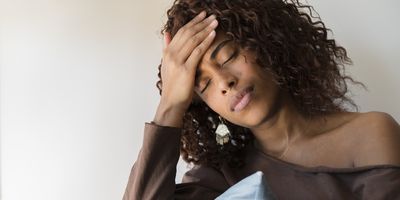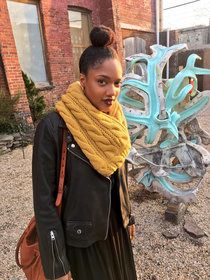Love & Relationships

Ad
Last week, fatherhood started trending on Twitter, provoking women everywhere to tear up a little - myself included. It all started when Iman Shumpert posted a picture of himself and daughter Junie, smiling and laughing for the camera. Immediately, fathers of Twitter followed suit, posting photos of themselves with their own daughters (and sons). I thought about my father, who was a part of my life as a child but has been mostly absent from my life. I thought about my son's father, who kisses his forehead and tells him he's "amazing" every chance he gets.
As black women, we have high hopes for fathers. Whether they are our own, or the men we choose to be fathers to our own children. Fathers impact us greatly, and as black women they can absolutely shape how we value ourselves - whether they are present our entire life or absent. Our parents determine how we will interact in intimate relationships for the rest of our lives. My mother taught me how to be a fiercely supportive friend. My father taught me how to be really hard on myself -
At some point, a man is going to affirm your physical beauty. He may even tell you what it's worth to him or attempt to speak for all men. You may not be asking for this affirmation, or perhaps you will be longing for it deep inside. That affirmation might come from a guy you meet at a party or a magazine ad created by male-dominated corporations or a JayZ song. Whether or not we like it, we are all impacted by what we feel when we look in the mirror. When you’re a black girl, and you are constantly told that you are insignificant - pretty can matter a lot.
The Other Kind of "Daddy Issues"
Last week, xoNecole posted this to Twitter:
Gabrielle Union, during an exclusive interview with xoNecole, described what she realized while standing in line to audition for a TuPac video in 1994:
“My self-esteem was so low that all I wanted was to be chosen [for a Tupac video]. For so many of us, we chase that and it isn’t necessarily just girls that weren’t raised with a father–my dad was there every day.”“He told me positive affirmations but my dad never said I was pretty. ‘That’s a great crossover’, ‘Nice jump shot’, ‘You’re so smart,’ but I was never validated for my looks. My parents thought that was the best route because you don’t validate young black girls for their looks; you validate them for their achievements.”
The reactions we received in response on Twitter and on Facebook ran the gamut. Some commenters through Gabrielle should just be happy she’s rich and famous. Others didn’t see the point of complaining about a fiercely present father just because he neglected to say, “you’re pretty”. Quite a few people felt confirmed that physical affirmation from their fathers was something they either needed but did not receive, or received with great appreciation.
Either way, two things were made extremely clear. Emotional needs are exclusive the individual and how they perceive support and even women raised with active fathers can have “daddy issues”.
Why Pretty Matters to Black Girls
Beauty is about empowerment and self-expression as well as defining yourself unapologetically. But, the reason this movement is so detrimental to our existence is because at some point, the wrong person told us we were pretty. And they probably told us we were pretty for the wrong reason.
So what happens when you are always affirmed for what you do but never for what you look like? There is a fine line between self-affirmation and needing your worth affirmed by others. Treading that line takes some very honest self-exploration.
So why is this element of parental support so important to - if not all black women - some black women? There are a few other statistics that come into play when it comes to how black women walk through this life. According to the Connecticut Alliance to End Sexual Violence, 40% of black women report coercive sexual conduct by the age of 18. Black women are also three times more likely to experience intimate partner violence. We are the least likely to make as much as our male counterparts in the corporate world. Black women face incredible challenges every day and confidence plays a part in how we deal with every single adversity. Confidence in our abilities and confidence in our attributes.
The Hard Truth About Black Women and Our Fathers
For Gabrielle Union, sexual abuse has played a major role in her life. She has been endearingly transparent about her own experiences shortly before the debut of Nate Parker's Birth of a Nation and more recently in her new book We're Going to Need More Wine which dropped this week.Regarding the damage that comes with surviving rape, perhaps knowing that she was more than an object that could be picked up and thrown back down by at will, just might have been circumvented by fatherly reassurance.
To say that Black women are not deeply affected by our interactions with the men in our life would be doing a disservice to our very evolution. We have come a long way, but it's also perfectly ok to want and need to feel pretty. It's ok to need to hear that from a man you trust and adore. It's also ok to decide you don't need that kind of outside confirmation at all. Ultimately we have to take ownership of what we want, need, never received or carry on without. Because believing your own worth is vital in the business of moving mountains.
ALSO ON XONECOLE


